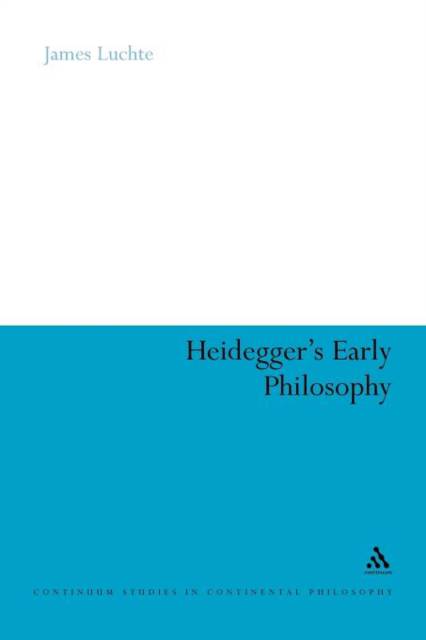
- Afhalen na 1 uur in een winkel met voorraad
- Gratis thuislevering in België vanaf € 30
- Ruim aanbod met 7 miljoen producten
- Afhalen na 1 uur in een winkel met voorraad
- Gratis thuislevering in België vanaf € 30
- Ruim aanbod met 7 miljoen producten
Omschrijving
In Heidegger's Early Philosophy, James Luchte sets forth a comprehensive examination of Heidegger's phenomenology between 1924 and 1929, during which time Heidegger was largely concerned with a radical temporalization of thought. The book seeks to re-construct Heidegger's radical phenomenology through an interpretation of all his published and unpublished works of the period, including the 1920s lecture courses and his published works, Kant and the Problem of Metaphysics and his magnum opus, Being and Time. The book also explores Heidegger's relationship with other philosophers, such as Husserl, Kant and Leibniz, with respect to the question of the relationship of thought and temporality.
The book addresses a significant void in the treatment of Heidegger's early phenomenology, emphasizing the importance of Heidegger's lecture courses and other works besides Being and Time, and thereby investigates the many fragments of Heidegger's work so as to more fully comprehend the meaning and significance of the original project. James Luchte makes an extraordinary and hugely important contribution to the field of Heidegger Studies.
Specificaties
Betrokkenen
- Auteur(s):
- Uitgeverij:
Inhoud
- Aantal bladzijden:
- 224
- Taal:
- Engels
- Reeks:
- Reeksnummer:
- nr. 67
Eigenschappen
- Productcode (EAN):
- 9781441197023
- Verschijningsdatum:
- 29/12/2011
- Uitvoering:
- Paperback
- Formaat:
- Trade paperback (VS)
- Afmetingen:
- 156 mm x 234 mm
- Gewicht:
- 303 g

Alleen bij Standaard Boekhandel
Beoordelingen
We publiceren alleen reviews die voldoen aan de voorwaarden voor reviews. Bekijk onze voorwaarden voor reviews.








